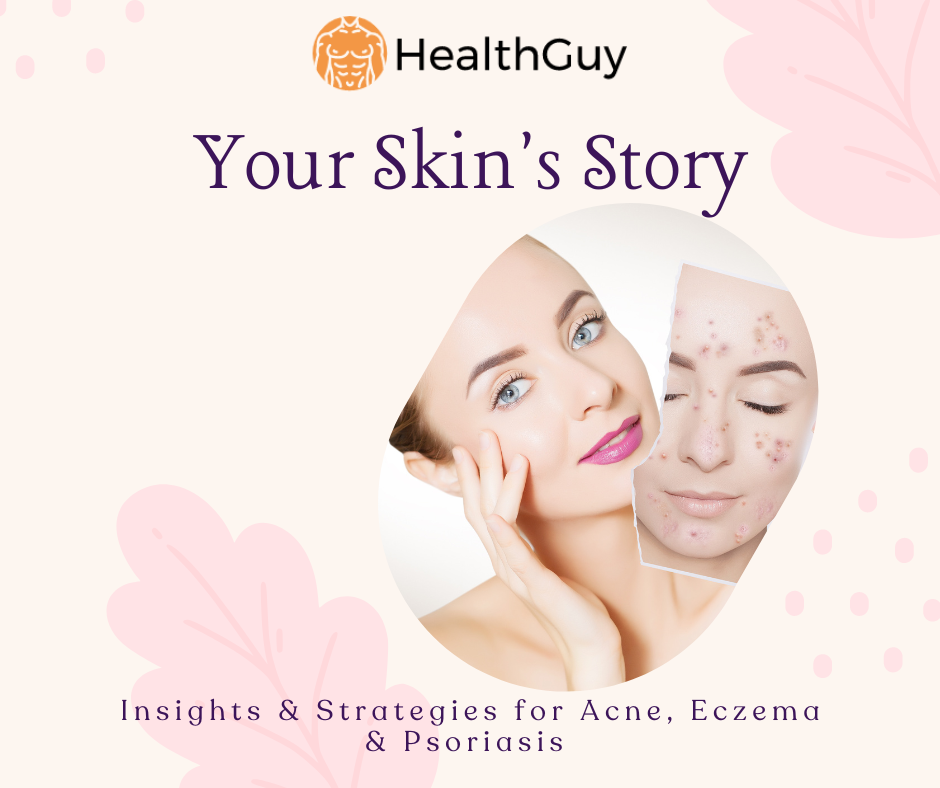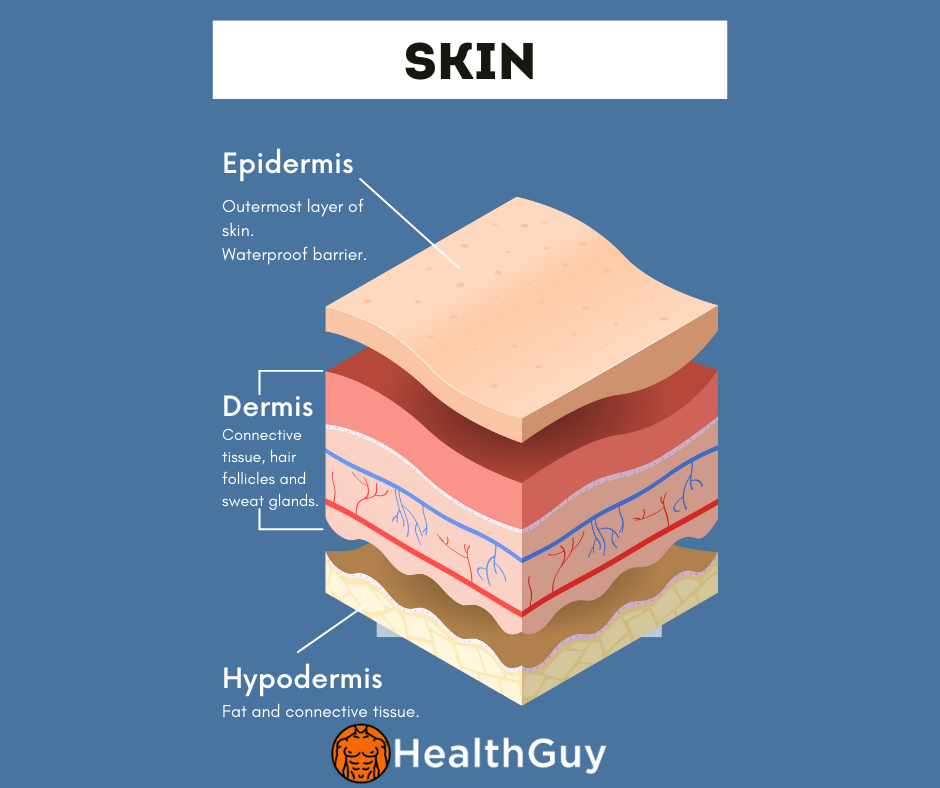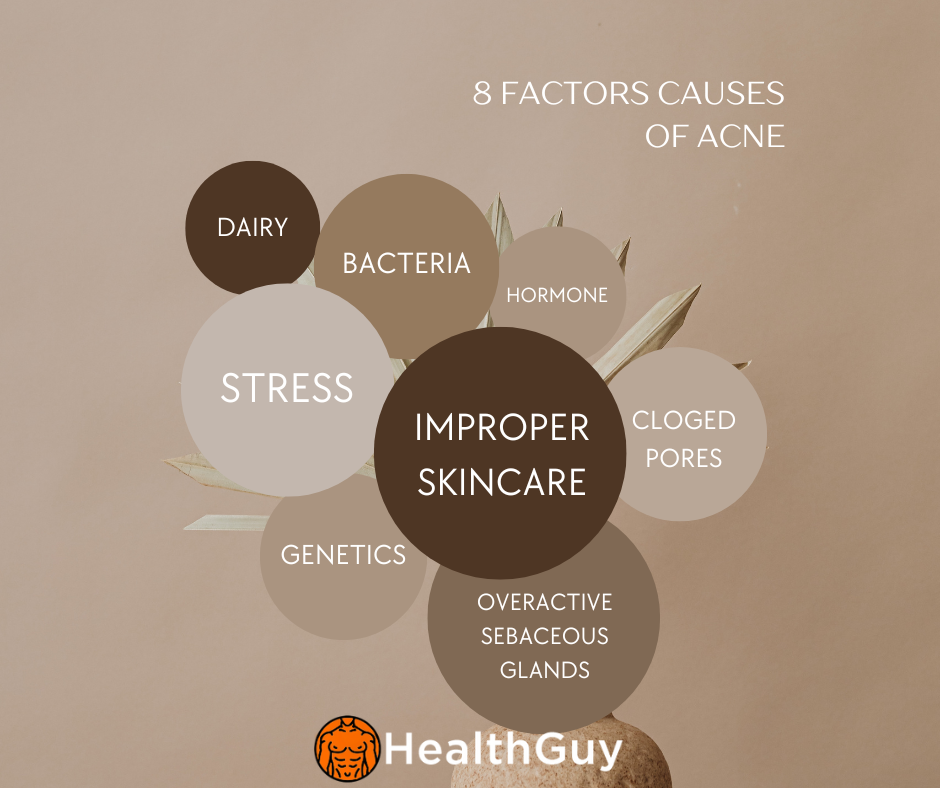
Your Skin’s Story: Insights & Strategies for Acne, Eczema & Psoriasis
The skin, our body’s largest organ, serves as a remarkable protective shield against the outside world. It acts as a barrier, guarding us against harmful pathogens, regulating body temperature, and preventing excessive water loss. However, despite its resilience, our skin is not impervious to various conditions that can disrupt its health and functionality.

Our skin consists of three primary layers: the epidermis, dermis, and subcutis. The outermost layer, the epidermis, acts as a barrier against environmental stressors and contains cells called keratinocytes that produce keratin, a protein that lends strength and waterproofing. Beneath the epidermis lies the dermis, a complex layer composed of collagen, elastin fibres, blood vessels, and nerves. The dermis provides structural support, elasticity, and nourishment to the skin. Deeper still, the subcutis, also known as the hypodermis, is made up of fat cells that insulate the body and serve as an energy reserve.
Despite its protective mechanisms, our skin is susceptible to a range of conditions, including acne, eczema, and psoriasis, which can disrupt its normal functioning and appearance. These conditions can cause discomfort, inflammation, and itching, and even impact an individual’s emotional well-being.
Understanding the causes, symptoms, and management strategies for common skin conditions is essential for effective care and improved quality of life. In the following sections, we will explore in detail three prevalent skin conditions: acne, eczema, and psoriasis. By gaining insights into these conditions, we can empower ourselves with the knowledge to navigate the challenges they present and seek appropriate treatment options for optimal skin health.
Acne
- Acne is a prevalent skin condition that primarily affects adolescents, although it can persist into adulthood for some individuals. It occurs when hair follicles become clogged with oil, dead skin cells, and bacteria, resulting in the formation of pimples, blackheads, and whiteheads. Hormonal changes, genetics, and certain medications can contribute to acne development.

- Symptoms of acne vary in severity, ranging from mild breakouts to more severe cystic acne. These symptoms often appear on the face, chest, back, and shoulders. While acne can be physically uncomfortable, it can also impact an individual’s self-esteem and mental well-being.
- Managing acne involves a combination of lifestyle changes, skincare routines, and medical interventions. Basic practices such as regular cleansing, avoiding excessive scrubbing, and using non-comedogenic products can help. Over-the-counter topical treatments containing ingredients like benzoyl peroxide or salicylic acid can also be effective. In more severe cases, a dermatologist may prescribe oral medications or recommend procedures such as laser therapy or chemical peels.
Eczema:
- Eczema, also known as atopic dermatitis, is a chronic inflammatory skin condition characterized by itchy, red, and dry patches. It affects people of all ages, but it commonly begins in childhood and may persist into adulthood. Eczema is believed to have a genetic component and is often associated with allergies and asthma.
- The symptoms of eczema can vary from mild to severe, with flare-ups triggered by certain factors like irritants, allergens, stress, and climate conditions. The affected areas can become intensely itchy, leading to scratching, which worsens the condition and increases the risk of infections.
- Managing eczema involves a multifaceted approach. Keeping the skin moisturized is crucial, and using gentle, fragrance-free products can help prevent flare-ups. Avoiding triggers, such as harsh soaps, certain fabrics, and allergenic foods, is also important. Topical corticosteroids or non-steroidal anti-inflammatory creams may be prescribed during flare-ups, while oral medications and phototherapy can be considered for severe cases.
Psoriasis:
- Psoriasis is a chronic autoimmune condition that speeds up the skin cell turnover, causing an excessive buildup of cells on the skin’s surface. This results in thick, red patches covered with silvery scales. The exact cause of psoriasis is not fully understood, but it involves genetic and immune system factors.
- The symptoms of psoriasis can vary widely, with different forms of the condition presenting different characteristics. Plaque psoriasis is the most common type and typically appears on the elbows, knees, scalp, and lower back. Other forms include guttate, inverse, pustular, and erythrodermic psoriasis.
- Managing psoriasis aims to alleviate symptoms, reduce inflammation, and slow down skin cell turnover. Regular moisturizing and bathing with gentle products can help soothe the skin. Topical treatments such as corticosteroids, retinoids, and vitamin D analogues are commonly prescribed. For more severe cases, oral medications, biologic drugs, or light therapy may be recommended.
Conclusion:
Acne, eczema, and psoriasis are common skin conditions that can significantly impact an individual’s physical and emotional well-being. Understanding the causes, symptoms, and management strategies for these conditions is crucial for effective care.
While lifestyle modifications and basic skincare practices play a role in managing these skin conditions, it is important to consult a dermatologist for a proper diagnosis and personalized treatment plan. Dermatologists can provide tailored advice, prescribe appropriate medications, and recommend advanced procedures if necessary. With the right approach, individuals with acne, eczema, and psoriasis can find relief and improve their overall skin health and quality of life.
